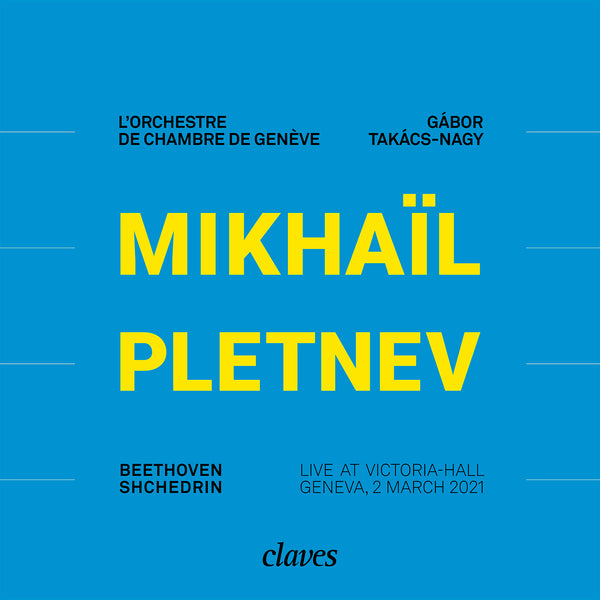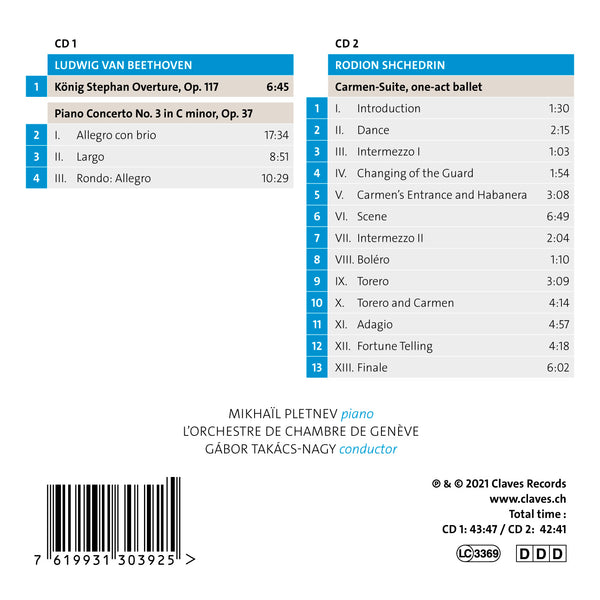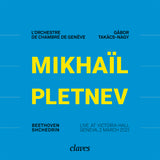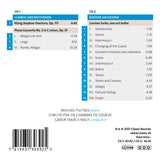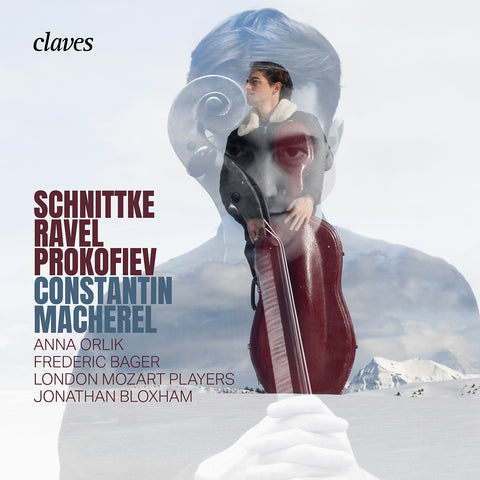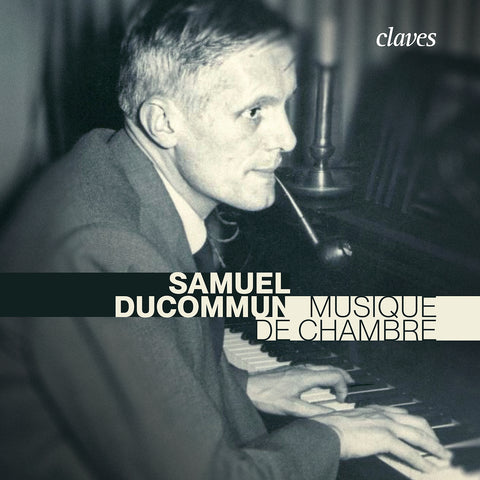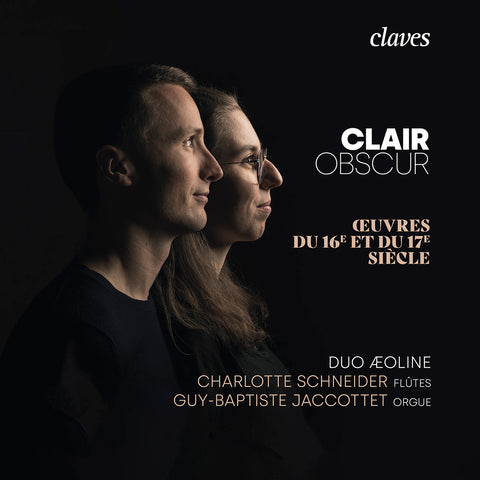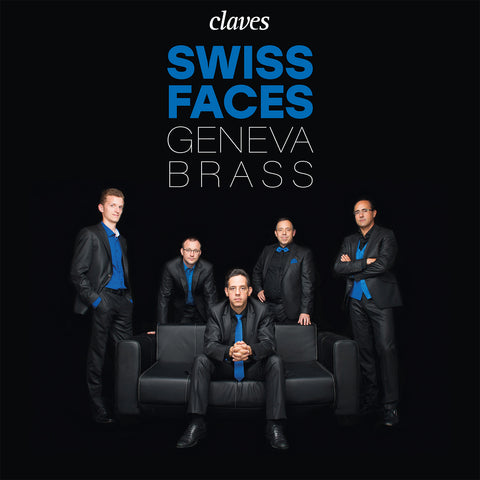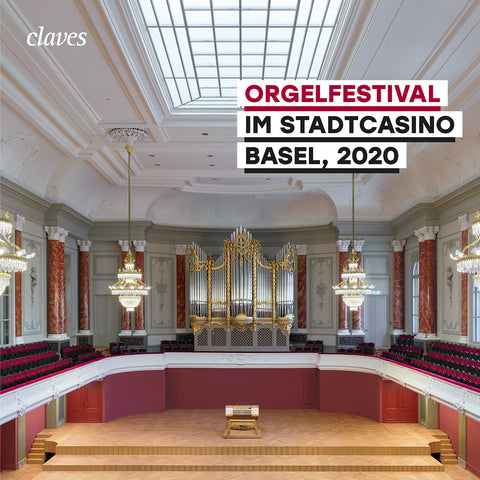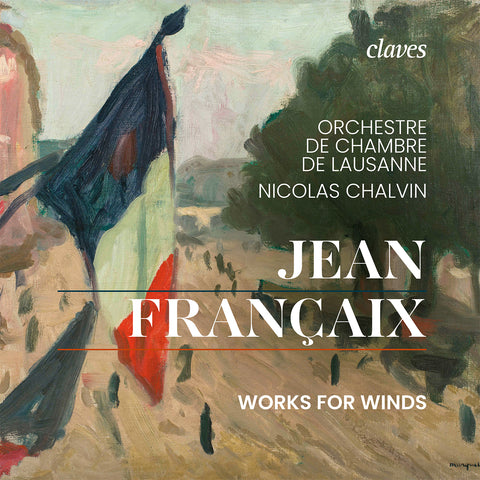(2022) Mikhaïl Pletnev, L'Orchestre de Chambre de Genève, Gábor Takács-Nagy - Live at Victoria-Hall Geneva, 2 March 2021
Catégorie(s): Concerto Orchestral Piano
Instrument(s): Piano
Compositeur principal: Ludwig van Beethoven
Orchestre: L'Orchestre de Chambre de Genève
Chef: Gábor Takács-Nagy
Nb CD(s): 2
N° de catalogue:
CD 3039/40
Sortie: 11.02.2022
EAN/UPC: 7619931303925
Cet album est en repressage. Précommandez-le dès maintenant à un prix spécial.
CHF 24.00
Cet album n'est plus disponible en CD.
Cet album n'est pas encore sorti. Précommandez-le dès maintenant.
CHF 24.00
Cet album n'est plus disponible en CD.
CHF 24.00
TVA incluse pour la Suisse et l'UE
Frais de port offerts
Cet album n'est plus disponible en CD.
TVA incluse pour la Suisse et l'UE
Frais de port offerts
Cet album est en repressage. Précommandez-le dès maintenant à un prix spécial.
CHF 24.00
Cet album n'est plus disponible en CD.
This album has not been released yet.
Pre-order it at a special price now.
CHF 24.00
Cet album n'est plus disponible en CD.
CHF 24.00
Cet album n'est plus disponible en CD.
MIKHAÏL PLETNEV, L'ORCHESTRE DE CHAMBRE DE GENÈVE, GÁBOR TAKÁCS-NAGY - LIVE AT VICTORIA-HALL GENEVA, 2 MARCH 2021
DANS LA LUMIÈRE BLANCHE DU MOMENT
Ce n'aurait dû être qu'un concert mémorable de plus dans la vie trépidante de l'Orchestre de chambre de Genève. Mais la pandémie mondiale de Covid-19 en a décidé autrement et a fait de cette rencontre au sommet avec le chef d'orchestre Gábor Takács-Nagy et le pianiste Mikhaïl Pletnev un moment historique. Chronique d'une aventure extraordinaire... à tous points de vue.
Le mardi 2 mars 2021 était une date inscrite dans le calendrier de l'orchestre, tout comme les dates des nombreux autres concerts de la saison. A la différence que depuis mars 2020 et le premier blocage général de la planète musique (ainsi que d'une bonne partie des autres activités), il est devenu habituel d'envisager l'avenir avec une extrême méfiance dans l'attente quotidienne de devoir répondre à quelque nouvelle mesure de ralentissement. Alors que les concerts reprenaient timidement au début de l'automne précédent, le coup de massue que tout le monde redoutait est tombé le 3 novembre à 15 heures : le Conseil d'Etat genevois a décidé que tout devait à nouveau fermer ! Tout ? La question s'est immédiatement posée, et nous avons déjà commencé à réfléchir pour sauver ce qui pouvait encore l'être. Si les répétitions avec des ensembles professionnels suivant un protocole sanitaire strict étaient encore autorisées à huis clos, un concert donné sans public pouvait-il être assimilé à une répétition, légalement parlant ? La direction de l'orchestre a poussé un soupir de soulagement en apprenant que c'était le cas... le monde ne s'était donc pas complètement arrêté de tourner ! La saison 20-21 se poursuit comme prévu dans le même splendide Victoria Hall mais devant des chaises vides...et des caméras. L'âge d'or éblouissant du streaming vidéo a commencé. « Une expérience étrange pour les musiciens », selon Frédéric Steinbrüchel, directeur général de l'orchestre. « Vous donnez tout ce que vous pouvez, et personne n'est là pour le recevoir ».
Les semaines et les mois passent : l'hiver est critique sur le plan sanitaire. Bien qu'une première et timide allocation de 50 spectateurs par représentation ait été annoncée pour le printemps 2021, la date du 2 mars semblait encore sans public. L'orchestre n'ayant pas l'intention de se priver d'une telle affiche, il s'est efforcé de trouver un autre moyen de promouvoir l'événement. La maison de disques Claves a été approchée et a été séduite par l'idée d'enregistrer le concert en direct. Pour Frédéric Steinbrüchel, toujours soucieux d'accompagner le public dans son expérience musicale, le défi ne s'arrête pas là : « Pour offrir au public quelque chose d'émotionnel et de vivant, mais aussi pour garder une trace de ces circonstances extraordinaires, j'ai contacté le documentaliste espagnol Alexis Delgado, qui a accepté au pied levé de venir à Genève avec son équipe. Une telle situation d'urgence permet des choses qui normalement ne seraient pas possibles ou plus difficiles à organiser. A son arrivée, le producteur du film a expliqué que son travail serait grandement facilité s'il pouvait le relier à un thème sous-jacent « dramatique ». Il ne pouvait pas mieux dire : le matin du concert, alors que la répétition générale filmée était sur le point de commencer, le ciel est tombé sur l'équipe dirigeante de l'orchestre.
>> Lire la suite du texte dans le livret <<
>> Lire ce texte en Français <<
Antonin Scherrer
Traduit de l'Anglais avec www.DeepL.com/Translator
***
MIKHAIL PLETNEV piano
Mikhail Pletnev est un pianiste brillant, un chef d'orchestre très recherché, un splendide compositeur, un individu remarquable et un artiste qui défie les classifications conventionnelles. « Une virtuosité stupéfiante et une ingéniosité étincelante sont les caractéristiques de ses interprétations au piano. Sa carrière fulgurante de chef d'orchestre semble avoir rendu son jeu encore plus symphonique et sa sonorité plus imaginative ». (Die Welt)
Né en 1957 à Arkhangelsk, Pletnev a démontré très tôt son talent en entrant au conservatoire de Moscou à l'âge de 13 ans. En 1978, il a remporté le premier prix et la médaille d'or au sixième concours international Tchaïkovski. Depuis, il s'est produit à d'innombrables reprises en tant que soliste avec les orchestres et les chefs d'orchestre les plus réputés du monde. En 1990, avec l'accord du dirigeant soviétique de l'époque, Mikhaïl Gorbatchev, Pletnev a fondé l'Orchestre national russe, le premier orchestre non gouvernemental russe financé par le secteur privé. Aujourd'hui, l'ONR est considéré comme l'un des meilleurs orchestres au monde ; chaque année, sous la direction de Pletnev et d'autres chefs d'orchestre éminents, il effectue des tournées en Europe, aux États-Unis et en Asie. En 1996, l'orchestre s'est produit lors de l'ouverture des Jeux olympiques d'Atlanta.
Pletnev enregistre chez Deutsche Grammophon depuis 1993, et ses disques ont été nominés à plusieurs reprises pour les Grammy Awards. « Si la musique est un temps façonné, le temps pour Pletnev n'est pas quelque chose qui peut être mesuré en termes techniques, mais plutôt le grand art de l'infini, de la tension et de sa résolution ». (Crescendo, sur le cycle de Beethoven). Le London Telegraph a remarqué que « des doigts et du cerveau de Pletnev jaillissent des idées qui vitalisent la musique et la rendent pleine de fraîcheur et d'esprit. [Il a fait en sorte que la musique saute positivement de joie ». Le Times décrit son jeu comme « né d'une prodigieuse virtuosité de l'imagination, d'une beauté scandaleuse ». Le BBC Music Magazine a qualifié les Sonates pour clavier de Scarlatti, qui ont reçu un Gramophone Award en 1996, de « jeu pianistique à son apogée... cette interprétation suffirait à elle seule à assurer à Pletnev une place parmi les plus grands pianistes que l'on ait jamais connus ». Pletnev a également obtenu une reconnaissance internationale pour son travail de compositeur. La création en 1998 de son Concerto pour alto dédié à Yuri Bashmet (et interprété par lui) a été accueillie avec enthousiasme par la presse et le public. Ses arrangements pour piano de Casse-Noisette et de La Belle au bois dormant de Tchaïkovski sont légendaires - pour les pianistes du monde entier, ils sont devenus des examens techniques qui démontrent que l'on maîtrise l'instrument.
Un journaliste a récemment écrit : « Une conversation avec Mikhail Pletnev ressemble à son jeu. Il est silencieux et écoute. Il est fatigué des mêmes vieilles questions ; il préfère improviser. Si quelque chose ne lui plaît pas, il se lève et s'en va. Si quelque chose l'intéresse, il se réveille et se met à parler d'une voix obsédée, monocorde et musicale. Pletnev ne parle pas de l'ordinaire, il ne s'intéresse qu'aux superlatifs ». Pletnev a souvent reçu des distinctions nationales et des prix internationaux, notamment un Grammy (2005). En 2007, il a reçu le prix et l'ordre présidentiels « pour service rendu à la patrie ».
>> Lire ce texte en Français <<
Traduit de l'Anglais avec www.DeepL.com/Translator
REVIEWS
“[..] From my symphonic background, I miss at times the warmth and fullness of orchestral sound, as this was played by a numerically constrained and somewhat spread out chamber orchestra. The logistic challenges give an interesting up-close aural perspective to orchestral playing, and at times one can hear sounds of fingers hitting strings, breathing, and humming sounds reminiscent of Casals. However, there is much of musical interest and some very fine chamber and solo playing. A spirited and fiery recording, with much character throughout, no doubt spiked by the adrenalin of recording in such challenging circumstances!” - Helen Tuckey, October 2022
« Le présent album propose l’intégralité du concert donné sans public le 2 mars 2021 au Victoria Hall de Genève, en pleine pandémie. Il s’est cependant déroulé devant les caméras afin de le diffuser en streaming. La notice explique les circonstances de l’enregistrement qui a abouti au double processus, celui du produit Claves et celui de la séquence filmée. Avec des difficultés de dernière minute : la positivité au Covid du premier violon, qu’il a fallu remplacer en urgence, ainsi que l’isolement du petit nombre d’instrumentistes qui ont été en contact direct avec lui. Ceci résolu, le concert a pu avoir lieu, tel qu’il est disponible aujourd’hui. [..] On classera sans hésiter cet album inégal au rayon consacré à Shchedrin. Beethoven se consolera vite avec d’autres versions du troisième concerto qui lui rendent mieux justice. » - Jean Lacroix, janvier 2022
(2022) Mikhaïl Pletnev, L'Orchestre de Chambre de Genève, Gábor Takács-Nagy - Live at Victoria-Hall Geneva, 2 March 2021 - CD 3039/40
DANS LA LUMIÈRE BLANCHE DU MOMENT
Ce n'aurait dû être qu'un concert mémorable de plus dans la vie trépidante de l'Orchestre de chambre de Genève. Mais la pandémie mondiale de Covid-19 en a décidé autrement et a fait de cette rencontre au sommet avec le chef d'orchestre Gábor Takács-Nagy et le pianiste Mikhaïl Pletnev un moment historique. Chronique d'une aventure extraordinaire... à tous points de vue.
Le mardi 2 mars 2021 était une date inscrite dans le calendrier de l'orchestre, tout comme les dates des nombreux autres concerts de la saison. A la différence que depuis mars 2020 et le premier blocage général de la planète musique (ainsi que d'une bonne partie des autres activités), il est devenu habituel d'envisager l'avenir avec une extrême méfiance dans l'attente quotidienne de devoir répondre à quelque nouvelle mesure de ralentissement. Alors que les concerts reprenaient timidement au début de l'automne précédent, le coup de massue que tout le monde redoutait est tombé le 3 novembre à 15 heures : le Conseil d'Etat genevois a décidé que tout devait à nouveau fermer ! Tout ? La question s'est immédiatement posée, et nous avons déjà commencé à réfléchir pour sauver ce qui pouvait encore l'être. Si les répétitions avec des ensembles professionnels suivant un protocole sanitaire strict étaient encore autorisées à huis clos, un concert donné sans public pouvait-il être assimilé à une répétition, légalement parlant ? La direction de l'orchestre a poussé un soupir de soulagement en apprenant que c'était le cas... le monde ne s'était donc pas complètement arrêté de tourner ! La saison 20-21 se poursuit comme prévu dans le même splendide Victoria Hall mais devant des chaises vides...et des caméras. L'âge d'or éblouissant du streaming vidéo a commencé. « Une expérience étrange pour les musiciens », selon Frédéric Steinbrüchel, directeur général de l'orchestre. « Vous donnez tout ce que vous pouvez, et personne n'est là pour le recevoir ».
Les semaines et les mois passent : l'hiver est critique sur le plan sanitaire. Bien qu'une première et timide allocation de 50 spectateurs par représentation ait été annoncée pour le printemps 2021, la date du 2 mars semblait encore sans public. L'orchestre n'ayant pas l'intention de se priver d'une telle affiche, il s'est efforcé de trouver un autre moyen de promouvoir l'événement. La maison de disques Claves a été approchée et a été séduite par l'idée d'enregistrer le concert en direct. Pour Frédéric Steinbrüchel, toujours soucieux d'accompagner le public dans son expérience musicale, le défi ne s'arrête pas là : « Pour offrir au public quelque chose d'émotionnel et de vivant, mais aussi pour garder une trace de ces circonstances extraordinaires, j'ai contacté le documentaliste espagnol Alexis Delgado, qui a accepté au pied levé de venir à Genève avec son équipe. Une telle situation d'urgence permet des choses qui normalement ne seraient pas possibles ou plus difficiles à organiser. A son arrivée, le producteur du film a expliqué que son travail serait grandement facilité s'il pouvait le relier à un thème sous-jacent « dramatique ». Il ne pouvait pas mieux dire : le matin du concert, alors que la répétition générale filmée était sur le point de commencer, le ciel est tombé sur l'équipe dirigeante de l'orchestre.
>> Lire la suite du texte dans le livret <<
>> Lire ce texte en Français <<
Antonin Scherrer
Traduit de l'Anglais avec www.DeepL.com/Translator
***
MIKHAIL PLETNEV piano
Mikhail Pletnev est un pianiste brillant, un chef d'orchestre très recherché, un splendide compositeur, un individu remarquable et un artiste qui défie les classifications conventionnelles. « Une virtuosité stupéfiante et une ingéniosité étincelante sont les caractéristiques de ses interprétations au piano. Sa carrière fulgurante de chef d'orchestre semble avoir rendu son jeu encore plus symphonique et sa sonorité plus imaginative ». (Die Welt)
Né en 1957 à Arkhangelsk, Pletnev a démontré très tôt son talent en entrant au conservatoire de Moscou à l'âge de 13 ans. En 1978, il a remporté le premier prix et la médaille d'or au sixième concours international Tchaïkovski. Depuis, il s'est produit à d'innombrables reprises en tant que soliste avec les orchestres et les chefs d'orchestre les plus réputés du monde. En 1990, avec l'accord du dirigeant soviétique de l'époque, Mikhaïl Gorbatchev, Pletnev a fondé l'Orchestre national russe, le premier orchestre non gouvernemental russe financé par le secteur privé. Aujourd'hui, l'ONR est considéré comme l'un des meilleurs orchestres au monde ; chaque année, sous la direction de Pletnev et d'autres chefs d'orchestre éminents, il effectue des tournées en Europe, aux États-Unis et en Asie. En 1996, l'orchestre s'est produit lors de l'ouverture des Jeux olympiques d'Atlanta.
Pletnev enregistre chez Deutsche Grammophon depuis 1993, et ses disques ont été nominés à plusieurs reprises pour les Grammy Awards. « Si la musique est un temps façonné, le temps pour Pletnev n'est pas quelque chose qui peut être mesuré en termes techniques, mais plutôt le grand art de l'infini, de la tension et de sa résolution ». (Crescendo, sur le cycle de Beethoven). Le London Telegraph a remarqué que « des doigts et du cerveau de Pletnev jaillissent des idées qui vitalisent la musique et la rendent pleine de fraîcheur et d'esprit. [Il a fait en sorte que la musique saute positivement de joie ». Le Times décrit son jeu comme « né d'une prodigieuse virtuosité de l'imagination, d'une beauté scandaleuse ». Le BBC Music Magazine a qualifié les Sonates pour clavier de Scarlatti, qui ont reçu un Gramophone Award en 1996, de « jeu pianistique à son apogée... cette interprétation suffirait à elle seule à assurer à Pletnev une place parmi les plus grands pianistes que l'on ait jamais connus ». Pletnev a également obtenu une reconnaissance internationale pour son travail de compositeur. La création en 1998 de son Concerto pour alto dédié à Yuri Bashmet (et interprété par lui) a été accueillie avec enthousiasme par la presse et le public. Ses arrangements pour piano de Casse-Noisette et de La Belle au bois dormant de Tchaïkovski sont légendaires - pour les pianistes du monde entier, ils sont devenus des examens techniques qui démontrent que l'on maîtrise l'instrument.
Un journaliste a récemment écrit : « Une conversation avec Mikhail Pletnev ressemble à son jeu. Il est silencieux et écoute. Il est fatigué des mêmes vieilles questions ; il préfère improviser. Si quelque chose ne lui plaît pas, il se lève et s'en va. Si quelque chose l'intéresse, il se réveille et se met à parler d'une voix obsédée, monocorde et musicale. Pletnev ne parle pas de l'ordinaire, il ne s'intéresse qu'aux superlatifs ». Pletnev a souvent reçu des distinctions nationales et des prix internationaux, notamment un Grammy (2005). En 2007, il a reçu le prix et l'ordre présidentiels « pour service rendu à la patrie ».
>> Lire ce texte en Français <<
Traduit de l'Anglais avec www.DeepL.com/Translator
REVIEWS
“[..] From my symphonic background, I miss at times the warmth and fullness of orchestral sound, as this was played by a numerically constrained and somewhat spread out chamber orchestra. The logistic challenges give an interesting up-close aural perspective to orchestral playing, and at times one can hear sounds of fingers hitting strings, breathing, and humming sounds reminiscent of Casals. However, there is much of musical interest and some very fine chamber and solo playing. A spirited and fiery recording, with much character throughout, no doubt spiked by the adrenalin of recording in such challenging circumstances!” - Helen Tuckey, October 2022
« Le présent album propose l’intégralité du concert donné sans public le 2 mars 2021 au Victoria Hall de Genève, en pleine pandémie. Il s’est cependant déroulé devant les caméras afin de le diffuser en streaming. La notice explique les circonstances de l’enregistrement qui a abouti au double processus, celui du produit Claves et celui de la séquence filmée. Avec des difficultés de dernière minute : la positivité au Covid du premier violon, qu’il a fallu remplacer en urgence, ainsi que l’isolement du petit nombre d’instrumentistes qui ont été en contact direct avec lui. Ceci résolu, le concert a pu avoir lieu, tel qu’il est disponible aujourd’hui. [..] On classera sans hésiter cet album inégal au rayon consacré à Shchedrin. Beethoven se consolera vite avec d’autres versions du troisième concerto qui lui rendent mieux justice. » - Jean Lacroix, janvier 2022
Return to the album | Read the booklet | Composer(s): Ludwig van Beethoven | Main Artist: Mikhaïl Pletnev











